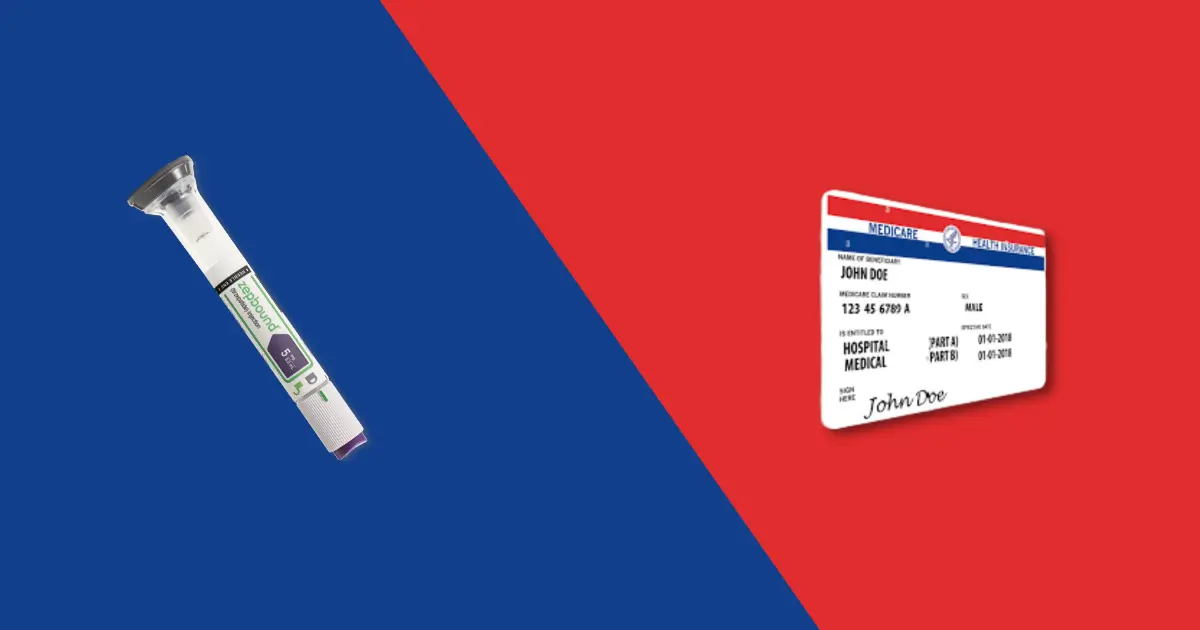Does Medicare cover Zepbound for weight loss?
Key highlights
- Weight loss medications like Zepbound or Ozempic can cost over $1,000 a month, or more than $12,000 per year without insurance.
- Zepbound (tirzepatide) is FDA-approved for weight loss in adults with obesity or overweight, but Medicare doesn’t cover it for weight loss.
- Medicare may cover Zepbound for obstructive sleep apnea depending on your plan.
- Check your Medicare coverage for Zepbound with the Plan Finder tool or contact your provider.
- If Zepbound is not covered by your plan, you may find savings through manufacturer discounts, patient assistance programs, and pharmacy discount cards.
Zepbound (tirzepatide) is an FDA-approved injectable medication for weight loss in adults with obesity or overweight with one or more weight-related health conditions. The U.S. Food and Drug Administration (FDA) also approved Zepbound for obstructive sleep apnea in adults with obesity alongside diet and exercise in December 2024.
It is important to understand how Medicare covers medications, so you know what’s included in your plan and avoid unexpected costs. Medicare does not currently cover Zepbound for weight loss. Medicare will typically cover Zepbound for obstructive sleep apnea with obesity.
Find out if your Medicare plan covers Zepbound and explore other options if coverage isn’t available.
What is Zepbound?
Zepbound (tirzepatide) is an FDA-approved injectable prescription medication for adults with obesity (BMI 30 or higher) or overweight (BMI 27 or higher) with at least one weight-related condition (high blood pressure, type 2 diabetes, high cholesterol, sleep apnea, cardiovascular disease). It’s intended to be used with a healthy, lower-calorie diet and increased physical activity to manage weight.
Zepbound is also the first and only approved prescription medication for adults with moderate-to-severe obstructive sleep apnea in adults with obesity. This FDA approval is based on the results of the SURMOUNT-OSA phase 3 clinical trials.
The list price of Zepbound is $1,059.87 according to the manufacturer, Eli Lilly. Your retail price will vary depending on where you live and which pharmacy you buy from.
Mounjaro is another brand-name drug that was FDA-approved for type 2 diabetes and contains the same active ingredient as Zepbound.
Understanding Medicare prescription drug coverage
Medicare prescription drug coverage is available through two main options: Medicare Part D and Medicare Advantage plans with prescription drug coverage.
Medicare Part D covers prescription medications including generic and brand-name drugs through private health insurance companies. Private health insurance companies also sell Medicare Supplement (Medigap) plans to help pay for your out-of-pocket costs in Original Medicare.
Medicare Advantage (Part C) plans are an alternative to Original Medicare and may include both medical and prescription drug coverage in one plan.
Whether Zepbound is covered depends on your specific Medicare plan, your medical condition, and the formulary (drug list) used by your plan. Each plan has a formulary which is a list of covered prescription drugs. If a drug is on the formulary, it will be covered.
If Zepbound is not on this list, you may need to consider other medications or appeal for coverage if the drug is medically necessary for you. The cost of the medication may vary depending on the formulary and tier of your plan.
Does Medicare cover Zepbound?
Medicare does not cover Zepbound for weight loss alone but it may provide coverage if you have obstructive sleep apnea and obesity, as Zepbound helps manage these conditions by promoting weight loss which can improve sleep apnea symptoms.
Coverage for Zepbound varies by your Medicare plan. For example, if you have a Medicare Part D plan, coverage depends on if the medication is on the plan’s formulary (list of covered drugs). Some plans will cover Zepbound if it’s prescribed for a medically necessary condition like sleep apnea with obesity, while other plans won’t cover it at all.
Check your plan’s formulary by reviewing your plan’s drug list which is usually on your plan provider’s website or in your plan documents. Alternatively, you can call your Medicare plan provider for more information. If Zepbound isn’t covered, ask about other options, appeal under the Affordable Care Act (ACA), or explore other covered treatments.
Will Medicare cover Zepbound for weight loss in the future?
There’s a chance Medicare might cover Zepbound for weight loss in the future because of a proposal from President Biden that would reclassify obesity as a chronic disease. The proposal says Medicare and Medicaid should cover weight loss medications, including drugs like Zepbound. This is part of the ongoing conversation about the growing health problems with obesity and its related conditions. However, this is still a proposal and not a law yet.
Medicare doesn’t cover weight loss drugs yet, but if the proposal passes, Zepbound will become accessible to more people.
How to check Medicare coverage for Zepbound
Here’s how to check if your Medicare plan covers Zepbound:
- Use Medicare’s Plan Finder Tool:Go to the Medicare website and use the Plan Finder tool. Enter your information and see the list of drugs covered by different Medicare Part D or Part C plans.
- Contact your Medicare provider:Call your Medicare plan provider. Ask if Zepbound is covered and what the costs and coverage options are.
- Speak with a pharmacist or healthcare provider:They can check if Zepbound is in your formulary and what to do next.
How much does Zepbound cost with Medicare?
The cost of Zepbound with Medicare can vary depending on whether your plan covers it and its drug tier on the formulary.
If Zepbound is covered
If your Medicare plan covers Zepbound, you may need to pay a copay (a set amount for each prescription) or meet a deductible (an amount you must spend before your plan starts covering costs).
The exact cost will depend on whether you have Medicare Part D or a Medicare Advantage plan with drug coverage. Copays typically range from a few dollars to a higher amount depending on your plan’s drug tier for Zepbound.
If Zepbound is not covered
If Zepbound is not covered, you will pay full price out of pocket which can be very expensive.
The list price of Zepbound is $1,059.87 for a 30-day supply. This price is set by the manufacturer Eli Lilly and does not include any additional charges or discounts a pharmacy may offer.
You may find a lower price at some pharmacies. Eli Lilly, the maker of Zepbound, offers a savings card to help make it more affordable.
If you don’t have insurance coverage, you can also purchase Zepbound vials directly from the manufacturer’s telehealth service LillyDirect. The 2.5 mg vial is $399 for a 30-day prescription and the 5 mg vial is $549 for a 30-day prescription.
Estimating costs
To estimate your costs, you can use Medicare’s Plan Finder tool which helps you find out if Zepbound is covered under your plan and what your out-of-pocket costs will be. You can also contact your Medicare provider or speak with a pharmacist to get more specific cost information.
Zepbound alternatives
While Zepbound has shown great results for weight loss, a generic or lower-cost alternative medication may be covered by your insurance plans such as:
- Saxenda (liraglutide): A glucagon-like peptide-1 (GLP-1) receptor agonist approved for weight management and can help with both weight loss and blood glucose control.
- Wegovy or Ozempic (semaglutide): Another GLP-1 receptor agonist manufactured by Novo Nordisk, approved by the FDA for weight management, with benefits for weight loss and improving blood sugar levels.
- Trulicity (dulaglutide): A medication for type 2 diabetes that may be prescribed off-label for weight loss, lowering the risk of heart attack, stroke, or death in people who have type 2 diabetes and heart disease.
- Alli (orlistat): An over-the-counter medication that is FDA-approved for weight loss in overweight adults, used in combination with a reduced-calorie and low-fat diet to help people lose weight.
- Contrave (naltrexone and bupropion): Contrave is a prescription weight loss medication that’s used in combination with a low-calorie diet and exercise.
Your healthcare provider may consider switching to a different medication based on your health condition and the latest guidelines on the treatment selection for Weight Management Medications for Chronic Use.
How to save on Zepbound without Medicare
To save on Zepbound without insurance, you can try these options to reduce your out-of-pocket costs.
- Zepbound Savings Card: Use the Zepbound savings card offered by the manufacturer to save if you have private or commercial insurance coverage and do not have any government-sponsored insurance like Medicare or Medicaid. If eligible, it can lower the cost to as low as $0.
- Patient Assistance Programs (PAP): Patient Assistance Programs are programs offered by drug manufacturers to provide medications at a lower cost or for free to those who need financial help. Currently, Eli Lilly’s Lilly Cares Foundation does not cover Zepbound, but this could change. Call The Lilly Answers Center Monday to Friday at 1-800-Lilly-Rx (1-800-545-5979) to see if you qualify for any other financial assistance programs.
- Pharmacy discounts and coupons: Drugs.com, SingleCare, OptumPerks, and GoodRx have discount cards for pharmacies that may help lower the cost of Zepbound.
- Alternative options such as HSA or FSA funds: If you have an HSA or FSA, you can use those funds to help pay for Zepbound.
- Single-dose vials: Lower doses of Zepbound (2.5 mg and 5 mg) are available in single-dose vials through LillyDirect, which can be cheaper than the pens if you’re paying out of pocket.
Frequently asked questions
Does Medicare Part D cover Zepbound?
Medicare Part D does not cover Zepbound for weight loss but may cover obesity-related sleep apnea depending on your plan.
What are the costs of Zepbound with Medicare?
The cost of Zepbound with Medicare depends on whether your plan covers it and which drug tier it’s listed on the formulary. If it’s covered, you may have to pay a copay or deductible, but if it’s not covered, you’ll need to pay the full price, which is over $1,000 per month.
How do I appeal if Medicare denies coverage?
If denied, you can appeal through your plan’s appeal process. You’ll need to explain why you think the medication should be covered and may need support from your doctor.
Are there similar medications covered by Medicare?
Yes, Medicare may cover other weight loss medications or obesity drugs if approved and prescribed for diabetes or heart disease. However, Medicare will not cover Zepbound if only prescribed for weight loss.
Bottom line
Medicare doesn’t currently cover weight loss medications but may cover them if prescribed for other FDA-approved conditions consistent with the medication’s FDA labeling.
Insurance coverage for Zepbound depends on your plan, deductible, and copay amounts, and may require prior authorization.
Check your Medicare plan with the Plan Finder tool to see if Zepbound is covered. If Zepbound isn’t covered, look into manufacturer savings programs, patient assistance programs, and pharmacy discounts to help reduce your costs. Consult with your healthcare provider to discuss alternative medications and the best treatment plan tailored to your needs.














